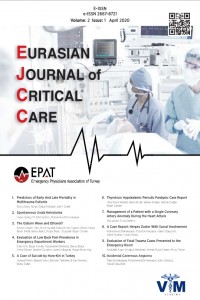Abstract
Introduction: Hara-Kiri, a traditional way of suicide in Japan, is a transverse stab wound on the abdomen. Suicide attempt rate with knife injuries on the abdomen is higher in Japan than in other countries, and especially there are very few clinical data about stab wound injuries involving the transverse section of the abdomen. There are no studies in our country about self-stabbing which is a psychiatric-surgical problem.
Case: A 62-year-old male patient admitted to the emergency department by ambulance for stabbing himself due to psychological problems. The omentum, stomach major curvature, and transverse colon were protruded from the transverse defect on the midline of the abdomen which is approximately 20 cm. After initial intervention and stabilization in the emergency room, the patient was transferred to the operation room and underwent urgent surgery.
Conclusion: The evaluation of the vital signs and physical examinations are important in suicidal patients and also the anamnesis regarding the source of the stab wounds could help dictate treatment and predict outcomes. Although mostly being non-lethal, abdominal stab injuries in suicidal patients can be significant. Also, the treatment should be planned in collaboration with the psychiatric team in survivor suicidal patients postoperatively.
Keywords
References
- 1. Morita S, Inokuchi S, Aoki H, Yamagiwa T, Iizuka S, Nakagawa Y, Yamamoto I. The comparison of characteristics and clinical features of self-inflicted abdominal stab wound patients in Japan: simple stab wounds versus Hara-kiri wounds. J Trauma 2008;64:786–9
- 2. Kato K, Kimoto K, Kimoto K, Takahashi Y, Sato R, Matsumoto H. Frequency and clinical features of patients who attempted suicide by Hara-Kiri in Japan. J Forensic Sci 2014;59:1303–6
- 3. Takai M, Yamamoto K, Iwamitsu Y, Miyaji S, Yamamoto H, Tatematsu S, Yukawa M, Ide A, Kamijo Y, Soma K, et al. Exploration of factors related to hara-kiri as a method of suicide and suicidal behavior. Eur Psychiatry 2010;25:409–13
- 4. Di Nunno N, Constantinides F, Bernasconi P, Di Nunno C: Suicide by hara-kiri: a series of four cases. Am J Forensic Med Pathol. 2001, 22: 68-72
- 5. Abdullah F, Nuernberg A, Rabinovici R. Self-inflicted abdominal stab wounds. Injury. 2003; 34: 35–39
- 6. Badger JM, Gregg SC, Adams CA Jr. Non-fatal suicide attempt by intentional stab wound: clinical management, psychiatric assessment, and multidisciplinary considerations. J Emerg Trauma Shock. 2012; 5 (3): 228–232
Abstract
Supporting Institution
yok
References
- 1. Morita S, Inokuchi S, Aoki H, Yamagiwa T, Iizuka S, Nakagawa Y, Yamamoto I. The comparison of characteristics and clinical features of self-inflicted abdominal stab wound patients in Japan: simple stab wounds versus Hara-kiri wounds. J Trauma 2008;64:786–9
- 2. Kato K, Kimoto K, Kimoto K, Takahashi Y, Sato R, Matsumoto H. Frequency and clinical features of patients who attempted suicide by Hara-Kiri in Japan. J Forensic Sci 2014;59:1303–6
- 3. Takai M, Yamamoto K, Iwamitsu Y, Miyaji S, Yamamoto H, Tatematsu S, Yukawa M, Ide A, Kamijo Y, Soma K, et al. Exploration of factors related to hara-kiri as a method of suicide and suicidal behavior. Eur Psychiatry 2010;25:409–13
- 4. Di Nunno N, Constantinides F, Bernasconi P, Di Nunno C: Suicide by hara-kiri: a series of four cases. Am J Forensic Med Pathol. 2001, 22: 68-72
- 5. Abdullah F, Nuernberg A, Rabinovici R. Self-inflicted abdominal stab wounds. Injury. 2003; 34: 35–39
- 6. Badger JM, Gregg SC, Adams CA Jr. Non-fatal suicide attempt by intentional stab wound: clinical management, psychiatric assessment, and multidisciplinary considerations. J Emerg Trauma Shock. 2012; 5 (3): 228–232
Details
| Primary Language | English |
|---|---|
| Subjects | Emergency Medicine |
| Journal Section | Case Reports |
| Authors | |
| Publication Date | April 26, 2020 |
| Submission Date | January 19, 2020 |
| Acceptance Date | March 2, 2020 |
| Published in Issue | Year 2020 Volume: 2 Issue: 1 |


